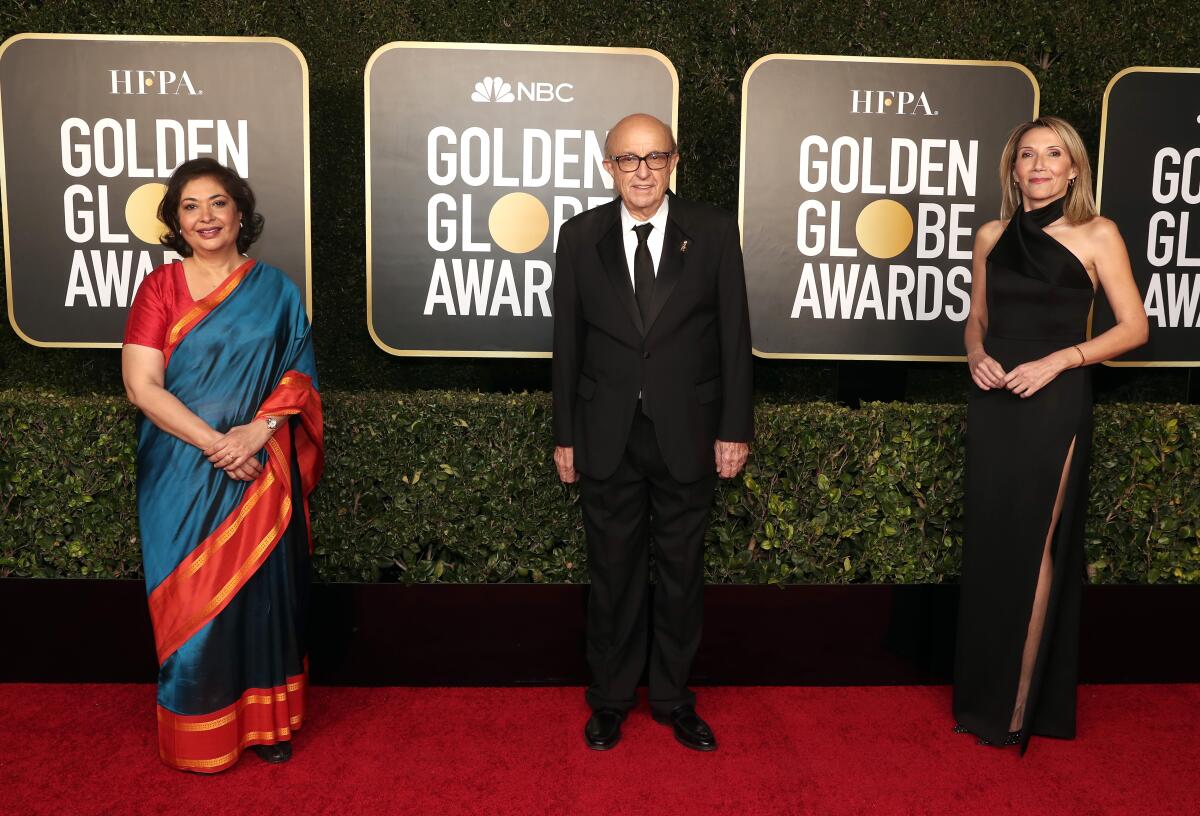Two Golden Globes voters resign in protest over HFPA’s ‘status quo’ reform efforts

Calling the Hollywood Foreign Press Assn. “toxic” and its reform efforts “window-dressing,” two members of the group that votes on the Golden Globe Awards resigned in protest Thursday.
“Insulation, silence, fear of retribution, self-dealing, corruption and verbal abuse are just a few ways to describe the current culture,” wrote Diederik van Hoogstraten, a member from the Netherlands, and Wenting Xu of China in their letter of resignation, sent to the HFPA’s leadership.
The duo’s departure comes at a critical time for the embattled organization that has vowed to enact sweeping changes following a Times investigation that brought to light allegations of financial and ethical improprieties and pointed out that not one of its 85 members is Black. The stories prompted a cascade of outrage in Hollywood culminating in NBC’s decision last month to cancel the 2022 Golden Globes broadcast.
In July, HFPA members are scheduled to vote on a slate of amendments, codifying the group’s new bylaws.
The members’ defection, however, raises questions about the HFPA’s ability to successfully enact meaningful reforms.
In the four months since the HFPA pledged a major restructuring, the organization has struggled to contain mounting pressures and crisis.
In April, former eight-term President Phil Berk was expelled after he sent an email to the group’s entire membership that referred to Black Lives Matter as “a racist hate movement.”
Then in May, Hollywood’s biggest power players — including Netflix, Amazon Studios, Warner Bros. and HBO — cut ties with the HFPA, announcing that they would not work with the group until more meaningful changes were enacted.
The strongest rebuke yet, however, appears to be coming from within.
“The majority of the membership resists transformative change, despite our lawyers and spokespersons suggesting otherwise publicly,” the two said in their letter. “Internal opposition to the status quo has been stifled, and critical voices such as ours have largely been ignored.”
Though the signatories said that they believe in the association’s potential and support its philanthropic endeavors, after attempting to work for change, they did not see a positive way to remain as members of the 78-year-old organization. “Staying inside the association is no longer tenable for us,” they wrote.
In a statement, the HFPA board called this a “crucial,” “historic and trying time” for the organization.
Reiterating its commitment to “transformational change,” the board said: “At a time when the overwhelming majority of our members have chosen to be a part of change, it is disappointing that some members have decided to try and splinter our organization and sow division and doubt.”

To date, the HFPA has implemented a number of reforms, including establishing a hotline to report incidents or allegations anonymously. Last month, the group hired two outside law firms to independently investigate reports to the hotline. As well, members approved a new code of conduct and retained a new diversity, equity and inclusion consultant. The Cambridge, Mass., firm Leadership Lab International was brought on board.
But the resigning HFPA members, who occupy a small, reform-minded faction, said the steps have fallen short. They said their recommendations for inclusion in the new bylaws were either diluted or disregarded altogether.
“The new bylaws written by the legal consultants of Ropes & Gray have been watered down significantly to meet the demands of the current Board and many change-averse members,” they wrote.
For example, they cited the amendment that would expand the current board to 15 members with the addition of three outside directors. This power imbalance, they wrote, “all but guarantees the current culture will continue to thrive.”
The members also took issue with the proposed process for admitting new candidates. A major criticism of the HFPA is that it has functioned like a country club, favoring members who are not full-time reporters or work for obscure media outlets to the exclusion of serious journalists, while capping annual admission at five new members a year.
According to draft bylaws under review, portions of which were described to The Times, a new nine-person credentials committee would be established, comprising four HFPA members — one of whom will be the HFPA’s president — and five outside journalism professionals. They would assess and determine the candidates for admission into the association. Initially, an oversight committee would pick the five outsiders; afterward, the board would select them.
The two HFPA members criticized the proposed bylaw changes, saying the leadership ignored recommendations that all members resign and reapply “under strict requirements.”
“There is still significant resistance to welcoming a large and diverse class of new members. The new proposed bylaws do not contain clear guidance for quickly identifying and admitting qualified journalists,” they wrote.
“I think it became clear to all of us and also to Ropes & Gray that the group of people who believe in deep, transformative, profound reform was a very small minority,” Van Hoogstraten, a former board director who has been with the HFPA for six years, told The Times.
Xu, who has been with the association for five years, said in an interview that the reform plan under consideration “still favors the organization’s current leadership, the same people in power, the same people who used to refuse to incorporate reforms and to welcome all members, the same people who were involved in lawsuits.”
Though the HFPA has publicly stated it is committed to accountability and transparency, the resigning members say they are in short supply.
“Internal transparency was never great to begin with, [and] has dramatically decreased since February, so members don’t know the details about the financials anymore,” they wrote in their letter. “But payments for internal jobs have skyrocketed lately. Morally and fiscally this self-dealing and sense of entitlement is a scandal in and of itself. But the lack of transparency goes beyond just the financials: since February most decision-making has happened behind closed doors. Questions and criticisms from us as well as outside critics have been waved off or dealt with by hired consultants, lawyers and PR agents.”
In their resignation letter, Van Hoogstraten and Xu also described “a toxic environment that undermines professional journalism,” calling the HFPA a place where “bullying of members by members is left unquestioned and unpunished. The badgering of talent and publicists: ditto.”
Xu said she received no reply from leadership to an email she sent in March, reviewed by The Times, in which she expressed the need for transparency, strong leadership, new members with serious journalism credentials and real top-down change.
In May, as the crisis intensified, Xu followed up with another email calling on board officers to step down.
Responding to Xu, Helen Hoehne, the group’s vice president, called her criticisms a “hate campaign,” telling Xu in an email reviewed by The Times, “I would welcome your input if you chose to direct your energy to working with us instead of against us.”
Van Hoogstraten said the organization remains toxic.
“The way people talk to one another, the way people cut each other off, bullying each other, verbally abuse each other to interrupt each other,” he said. “It is quite striking that that culture is effectively unchanged…. I can’t be a part of this anymore.”
Though Xu and Van Hoogstraten said that they don’t know how the situation will ultimately unfold, they believe the HFPA squandered numerous opportunities to make things right.
“That window has closed and Hollywood is moving on,” they wrote in their letter. “After we leave we plan to build a transparent, professional and inclusive organization.”
More to Read
Inside the business of entertainment
The Wide Shot brings you news, analysis and insights on everything from streaming wars to production — and what it all means for the future.
You may occasionally receive promotional content from the Los Angeles Times.










